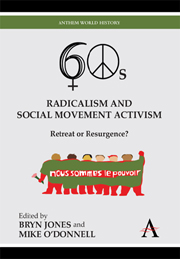Book contents
- Frontmatter
- Contents
- Introduction Sixties Radicalism: Creating Spaces and Leaving Legacies
- PART I Radical Movements Around the World
- PART II Theoretical & Cultural Significance
- PART III Social Movement Legacies
- 10 Sixties Movements, Educational Expansion and Cognitive Mobilisation: Postmaterialist Values and Unconventional Political Participation in West Germany
- 11 Carrying the Flame Forward: Activist Legacies of 1968 in Life Story Reflections
- 12 When the Personal Became Political: A Reappraisal of the Women's Liberation Movement's Radical Idea
- Conclusion
- Notes on Contributors
- Author Index
- Subject Index
12 - When the Personal Became Political: A Reappraisal of the Women's Liberation Movement's Radical Idea
from PART III - Social Movement Legacies
Published online by Cambridge University Press: 05 March 2012
- Frontmatter
- Contents
- Introduction Sixties Radicalism: Creating Spaces and Leaving Legacies
- PART I Radical Movements Around the World
- PART II Theoretical & Cultural Significance
- PART III Social Movement Legacies
- 10 Sixties Movements, Educational Expansion and Cognitive Mobilisation: Postmaterialist Values and Unconventional Political Participation in West Germany
- 11 Carrying the Flame Forward: Activist Legacies of 1968 in Life Story Reflections
- 12 When the Personal Became Political: A Reappraisal of the Women's Liberation Movement's Radical Idea
- Conclusion
- Notes on Contributors
- Author Index
- Subject Index
Summary
It began with a memo. Its original title (‘Some Thoughts in Response to Dottie's Thoughts on a Women's Liberation Movement’) suggests the spirit in which it was written. Carol Hanisch, a community organiser for the Southern Conference Educational Fund, was responding to a memo by another staff member. Like so many other activists in the civil rights movement, the antiwar movement, and the New Left, this colleague did not view the fledgling women's liberation movement as truly political. Dottie Zellner had been particularly scathing about the new vogue for consciousness-raising, which she dismissed as therapy.
Carol Hanisch was (in addition to being a civil rights activist) a member of New York Radical Women, credited with bringing consciousness-raising techniques into second wave feminism. The group was itself a response to what we would now view as a quite shocking array of sexist attitudes and practices that had, until then, gone unchallenged in radical circles. Early attempts to extend the logic of liberation to women had met with widespread derision, with opposition coming not just from men but women:
…they belittled us no end for trying to bring our so-called “personal problems” into the public arena—especially “all those body issues” like sex, appearance, and abortion. Our demands that men share the housework and childcare were likewise deemed a personal problem between a woman and her individual man. The opposition claimed if women would just “stand up for themselves” and take more responsibility for their own lives, they wouldn't need to have an independent movement for women's liberation. […]
- Type
- Chapter
- Information
- Sixties Radicalism and Social Movement ActivismRetreat or Resurgence?, pp. 211 - 224Publisher: Anthem PressPrint publication year: 2010
- 1
- Cited by



